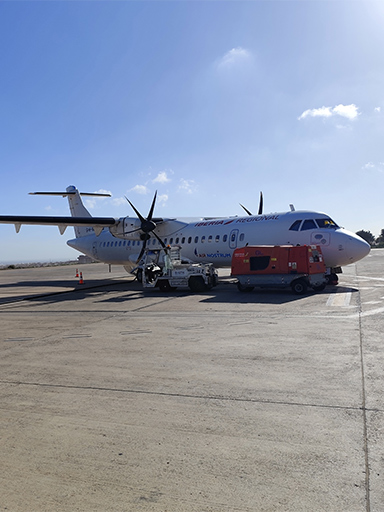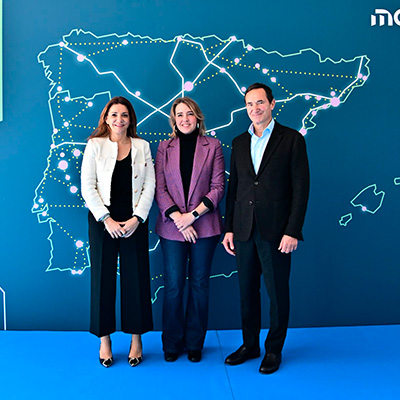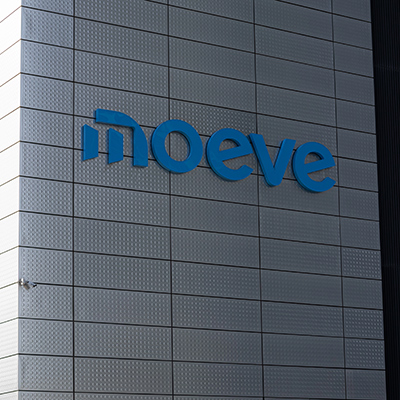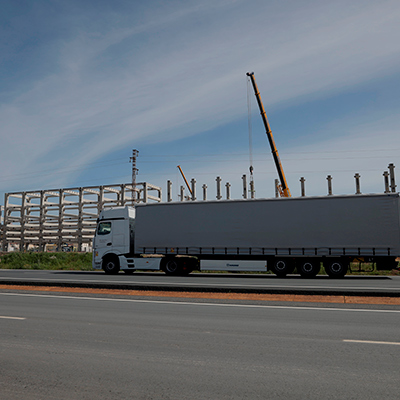- During October and November, all of Air Nostrum’s flights from Melilla Airport carried 30% SAF supplied by Moeve, part of both companies’ commitment to decarbonize the aviation sector
- This SAF supply represents a 15-fold increase in the EU's requirement for airlines, which will come into effect starting January 1, 2025 (2% SAF) and will gradually increase up to 70% by 2050
- Moeve produces SAF at its La Rábida Energy Park (Huelva) with used cooking oils and already supplies it at the main airports of Spain
- Air Nostrum, in a firm commitment to promoting sustainability in Melilla, has refueled with 60,000 liters of SAF in the last quarter of 2024
- SAF can reduce CO2 emissions by up to 90% throughout its entire life cycle compared to traditional kerosene
Specifically, all flights departing from this airport during October and November, all of which were operated by Air Nostrum, carried 30% of SAF supplied by Moeve. The amount of SAF is 15 times more than what European regulation will require as of 2025 under 'ReFuelEU Aviation', which establishes a minimum of 2%. Exolum, the storage operator at Melilla Airport, carried out the supply, ensuring an essential logistical component of supplying sustainable fuels to airlines.
SAF, produced by Moeve at its La Rábida Energy Park (Huelva) from used cooking oils, is a second-generation biofuel that can reduce CO2 emissions by up to 90% throughout its life cycle, compared to traditional kerosene.
Marta Cencillo, Head of Sustainable Aviation at Moeve, said: "It is a source of pride for us to be the first company to supply SAF in Melilla. This new milestone reinforces our commitment to the decarbonization of the aviation sector, especially in regions like Melilla that are difficult to access from the Peninsula, increasing the need for flight connections. This push is essential for getting SAF to airports across Spain. We are one of the main SAF producers and suppliers in Spain and already supply it on a permanent basis at the main airports of the country.”
Mª José Sanz Miguel, Director of Quality, Environment, and Emergencies of Air Nostrum, highlighted: "At Air Nostrum, we firmly believe in SAF as a lever for decarbonizing the aviation sector. This is why our commitment for 2030 is to use 10% of this sustainable fuel, a percentage that almost doubles the requirement set by the European 'ReFuelEU Aviation’ mandate. To advance with this commitment, we have chosen Melilla for this environmental initiative, also as a demonstration of our responsibility towards the people of Melilla. The aircraft that refueled in October and November at Melilla airport loaded 30% certified sustainable fuel, which significantly reduces their carbon footprint due to the emission savings enabled by SAF."
Commitment to SAF for decarbonizing the aviation sector
To ensure the supply of SAF to its clients, Moeve is developing, together with its partners, the largest second-generation biofuel production complex in Southern Europe, which will have a production capacity of 1 million tons of SAF and renewable diesel. With this project, the company is making further progress towards its objective of becoming the top producer of 2G biofuels in Spain and Portugal, with an annual production capacity of 2.5 million tons of biofuels by 2030. This includes 800,000 tons of SAF, enough for 2,000 flights around the planet 2,000.
The initiative developed by Moeve and Air Nostrum in Melilla supports several of the Sustainable Development Goals of the 2030 Agenda: SDG 7 (Affordable and clean energy), SDG 8 (Decent work and economic growth), SDG 12 (Responsible consumption and production), and SDG 13 (Climate action).
Air Nostrum, in its ecological transition plan, advocates SAF as a lever for decarbonization, committing to using 10% SAF by 2030, nearly doubling the requirements of the European mandate. Along with the progressive increase in SAF consumption, fuel savings through Big Data algorithms, artificial intelligence, and machine learning, improve operational efficiency.




